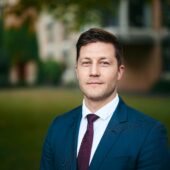
Dr Fabian Braesemann
Departmental Research Lecturer
Dr Fabian Braesemann is a Departmental Research Lecturer in AI & Work at the OII.
When announcing the Jubilee on Christmas Eve, Pope Francis proclaimed a year of hope: “A jubilee for our mother Earth, disfigured by profiteering; a time of jubilee for the poorer countries burdened beneath unfair debts; a time of jubilee for all those who are in bondage to forms of slavery old and new.”
While the Pope’s wishes for the new year are well-intended and much needed in a time of despair, hope alone will not be enough to make them come true. Experience tells us that profiteering will not see a break, that the staggering inequality between the Global North and South will not diminish, and that injustice, crime, and human trafficking will not end.
The problem is not with the Pope’s hopes or the issues identified in his speech. It is with the mechanism he proposes to overcome them. The same is true for similar calls expressed in the Christmas songs we are all used to hearing (for example: ‘And in His name, all oppression shall cease’ from O Holy Night) or most recently in King Charles’ Christmas speech (‘The Gospels speak so vividly of conflict and teach the values with which we can overcome it’).
Utopia is nowhere near, and no prophet or religious leader, from Jesus to Pope Francis, has succeeded in sustainably changing human nature to give up profiteering, greed, or any other values that would prevent humanity from permanently overcoming conflict.
After thousands of years of hopeless appeals to hope, we must accept that human nature will not change anytime soon. Instead of hoping for hope alone to solve the world’s problems, we need to develop a thorough understanding of the fundamental processes that bring about inequality, injustice and suffering from the often good intentions of people. We need to reveal the psychological, social, and historical laws that determine how we behave collectively in the ways we do, why we seemingly cannot escape these pre-determined pathways, and what we can actually do to change things.
So, what we need more than spiritual renewal is empirical research.
Luckily, this research is available to us thanks to the breakthroughs and advances made over the past two decades by social scientists, economists, mathematicians, physicists and computer scientists working together in a scientific field called ‘computational social science’.
Computational social scientists move away from simplistic theoretical models of behaviour, such as the economic man or rational agents. Instead, they analyse ever-increasing big data sets of human behaviour from past and current societies. They develop computational models with millions of individual agents to understand societal phenomena such as unemployment, inequality or political polarisation from the interactions of all these individual agents.
The models allow them to develop accurate computer simulations as ‘virtual laboratories’. In the simulations, they can compare different scenarios and test interventions that can actually turn the tables by developing mechanisms that align individual behaviour with desired outcomes.
Three examples illustrate how that research can help us to understand better how societies can resolve conflict and foster cooperation:
Computational models in evolutionary psychology show that cooperation in society can result from the interactions of greedy individuals alone. Lab experiments reveal that people cooperate not because of pure altruism but because of a mix of self-interest, fear of punishment and social norms. Policies that speak to all three are more efficient in making people cooperate than appeals to social norms or values alone.
Research into past societies reveals that the staggering levels of economic inequality we observe today are not only a modern phenomenon but have been experienced throughout history. In fact, complexity research shows that inequality can result from chance alone and is a characteristic feature of both nature and society due to so-called ‘multiplicative random processes’ (more widely known as compound interest). Education about this ‘natural’ tendency for the accumulation of resources can help to change the public debate from focusing on values like greed or profiteering towards the enabling factors of compound interest for many (such as decently paid jobs, broadly available saving schemes, etc.).
Equally, computational social science research has made progress in understanding why we see so much political polarisation these days – without accusing people of bad intentions or a decay of values. Research shows how polarisation arises in low-information environments, such as social media, and how it can be overcome with more information about political opponents’ often good intentions.
Computational social science is a young and rapidly developing field. It is far from having all the answers, but acknowledging and informing about where the problems actually come from—the complex interactions of individuals rather than human nature—is a first step in tackling them.
So, let us start the new year with hope. Not with the hope for a miracle but with the hope for better models, models that accurately describe the complex problems of our times. We need to understand their root causes, which often do not lie within ourselves but within the complex interplay of individuals interacting at various technological, social, and economic levels.
Let science guide us in developing empirical—even incomplete—models of how the societal outcomes we desire or want to avoid are the unintended consequences of the complex interactions of many, and let us use these models to design functional, evidence-based policies that can give us hope for a better future.
This is an opinion article by Dr Fabian Braesemann.